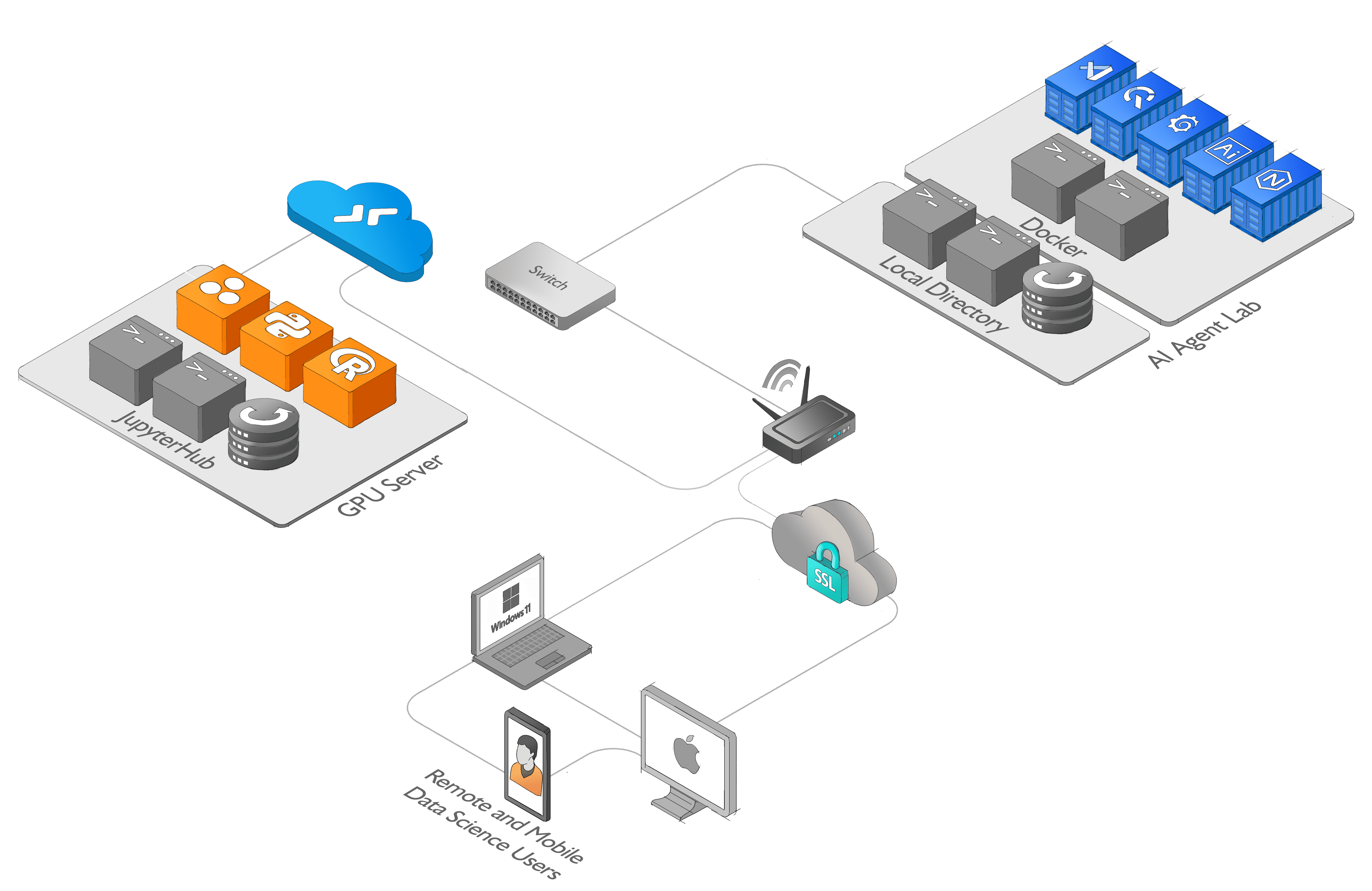The AI Agent Lab is a module-based environment for working with the GPT-3.5 architecture, designed to facilitate rapid experimentation and testing of language models. The AI Agent Lab includes a docker-compose configuration with QuestDB, Grafana, Code-Server, Nginx and an AI Agent, providing a seamless interface for managing and querying data, visualizing results, and coding in real-time. With the AI Agent Lab, users can quickly set up a notebook environment and start experimenting with GPT-3.5 models, without the need for complex setup or configuration
The AI Agent Lab is also the basis for the AI Agent Farm, a modular system for developing and deploying AI agents. By using the AI Agent Lab as a module in the AI Agent Farm, users can easily connect their agents to real-time data streams and other sources of information, allowing for more sophisticated and accurate decision-making. With its flexible and modular design, AI-Agent-Lab is a powerful tool for anyone working with GPT-3.5 models and data streams in their AI applications.
To use AI Agent Lab with a remote JupyterHub environment, follow these steps:
-
Set up or use an existing remote JupyterHub that includes the necessary dependencies for working with GPT-3.5 models and data streams.
-
Launch the AI Agent Lab using the provided docker-compose file.
-
Connect to the remote JupyterHub environment from within the Code-Server interface provided by AI-Agent-Lab.
Start working with GPT-3.5 models and data streams, using the pre-installed tools and libraries that are included in your remote environment.
-
QuestDB: QuestDB is a high-performance, open-source time-series database. It allows for efficient storage and querying of time-series data, making it ideal for working with real-time data streams.
-
Grafana: Grafana is a popular open-source platform for data visualization and monitoring. It provides a rich set of features for creating interactive dashboards and visualizing data from various sources.
-
Code-Server: Code-Server is a web-based IDE based on Visual Studio Code. It provides a familiar coding environment with features such as code completion, syntax highlighting, and debugging capabilities.
-
Nginx: Nginx is a widely-used web server and reverse proxy server. It enhances the AI Agent Lab by providing additional functionality for routing and load balancing, improving performance and security
-
AI Agent: The AI Agent is the core backend service in the AI Agent Lab, handling AI processing, data retrieval, and related operations.
-
AI Agent UI: The AI Agent UI provides an intuitive, web-based interface for interacting with the AI agent.
To use the AI Agent Lab, follow these steps:
-
Set up or use an existing environment with Docker installed.
-
Clone the AI Agent Lab repository and navigate to the docker directory.
git clone https://github.com/quantiota/AI-Agent-Lab.git
cd AI-Agent-Lab/docker
-
Follow all prerequisite steps that should be completed before bringing the Docker Stack. Refer to the Docker Readme file for guidance
-
Launch the AI Agent Lab using the provided docker-compose configuration.
docker compose up --build -d
- Once the services are up and running, you can access the AI Agent Lab interfaces:
- QuestDB: Visit https://questdb.domain.tld in your web browser.
- Grafana: Visit https://grafana.domain.tld in your web browser.
- Code-Server: Visit https://vscode.domain.tld in your web browser.
- AI Agent UI: Visit https://aigentui.domain.tld in your web browser.
- To connect the AI Agent Lab to a remote JupyterHub environment from Code-Server:
-
Set up or use an existing remote JupyterHub that includes the necessary dependencies for working with your notebooks and data.
-
Connect to the remote JupyterHub environment from within the Code-Server interface provided by the AI Agent Lab
Start working with your notebooks and data, using the pre-installed tools and libraries that are included in your remote environment.
For optimal performance, the AI Agent Lab requires the following hardware setup:
- Server: HP Microserver Gen8
- Processor: Quad-core CPU
- Primary Storage: 250GB SSD
- Memory: 16GB of RAM
- Controler: HP Smart Array P410
- Additional Storage: 4x1TB RAID data storage
- Operating System: Ubuntu 22.04 Server
-
Connect to a JupyterHub from Visual Studio Code. Visual Studio Code
-
Create an API Token. JupyterHub
